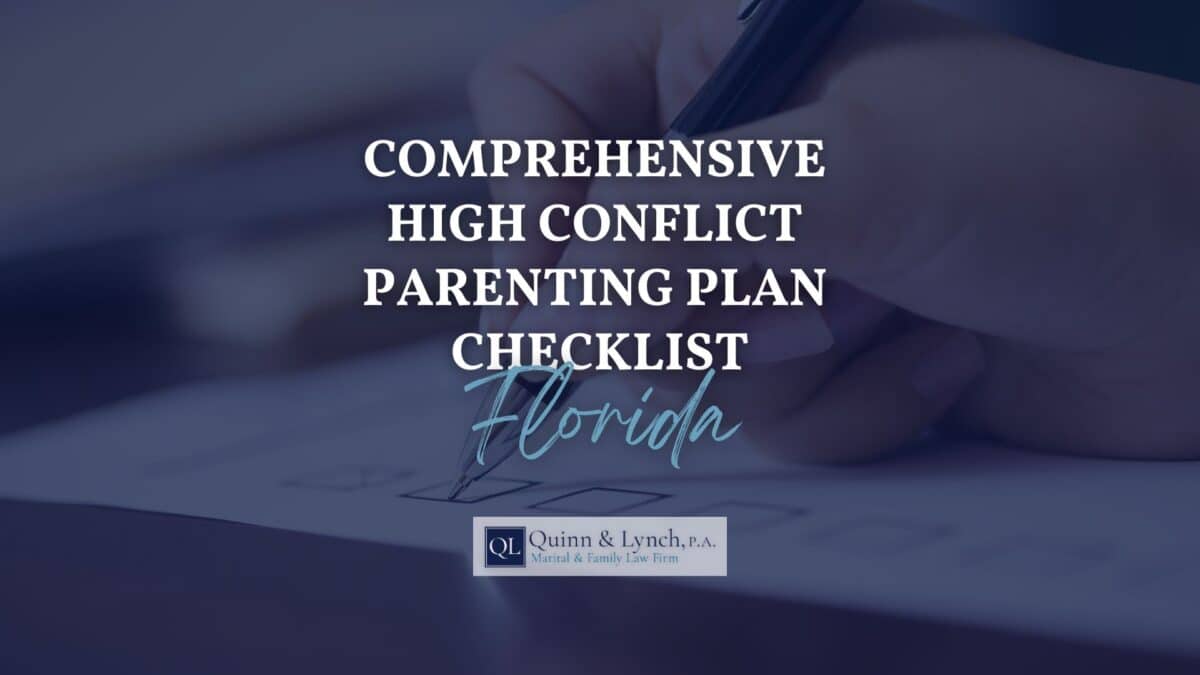A high-conflict parenting plan checklist is a critical component in child custody cases for high-conflict parents in Florida who struggle with effective co-parenting after separation or high-conflict divorce. When co-parents cannot agree on parenting decisions, a comprehensive parenting plan with clear guidelines helps establish each parent’s rights and enforceability. While there are numerous benefits, the goal of a high-conflict parenting plan in Florida is to provide a nurturing environment for children while addressing co-parenting aspects that may arise in child custody cases.
A high-conflict parenting plan should include specific methods to minimize conflicts, create clear procedures for child exchanges, and establish communication guidelines that help in resolving conflicts and keeping the negative impact away from children caught in the middle of high-conflict situations.
For legal assistance in creating a comprehensive parenting plan that protects your children’s best interests in high-conflict situations, contact a skilled child custody lawyer in Tampa, FL.
What is a High-Conflict Parent?
High-conflict parenting occurs when one parent or both co-parents are not good at resolving disputes. Typically, one parent refuses to cooperate in co-parenting and struggles with resolving conflicts related to child custody and parenting time. In such situations, communication breakdowns, ongoing legal battles, and emotional manipulation can negatively affect the children’s well-being.
In child custody cases, oftentimes one parent co-parents, while the other parent refuses to follow a parenting plan, respect child support orders, or adhere to clear guidelines set by family law courts.
High-conflict parents may struggle with decision-making processes, refuse to compromise in the decision-making process, and use the child to create tension with the other parent.
In such situations, comprehensive parenting plans allow co-parents to decide ahead on key elements. High-conflict parenting plan agreements also help resolve disagreements before they affect the co-parenting relationship.
How to Deal With a High-Conflict Co-Parent in Florida
A high-conflict parenting plan checklist is essential for high-conflict parents who struggle with effective co-parenting after separation or high-conflict divorce. When parents disagree on parenting decisions, a comprehensive parenting plan with objective guidance helps establish expectations and enforceability. A high-conflict parenting plan should include specific decision-making processes to minimize high-conflict situations, create clear procedures for child exchanges, and establish communication guidelines that prevent children from being caught in disputes.
High-Conflict Parenting Plan Checklist: A Guide for High-Conflict Parents

A high-conflict parenting plan must include structured decision-making processes for major decisions about the children’s well-being, including their school, medical care, and outside activities. Alternative dispute resolution methods, such as mediation or working with a parenting coordinator, can help when co-parents have difficulty resolving conflicts.
Parental Responsibility & Decision-Making
A high-conflict parenting plan will help with dispute resolution by allowing co-parents to decide ahead. This makes the decision-making process much less hostile for many high-conflict situations.
- Legal custody (joint legal custody vs. sole legal custody)
- Decision-making authority for major decisions (education, medical care, religious upbringing)
- Emergency medical care procedures
- Dispute resolution methods (parenting coordinator, mediation, court intervention)
- Communication protocols between parents regarding decision-making
- Parental responsibility for extracurricular activities and school involvement
Co-parents should decide ahead how to handle school meetings, school breaks, and report cards to avoid confusion.
Child Custody Time
- Physical custody arrangement (joint physical custody vs. sole physical custody)
- Parenting time schedule (regular time-sharing, school year, weekends, holidays)
- Equal time-sharing arrangement details
- Holiday and special event schedule (birthdays, Father’s Day, school breaks)
- Child exchanges (location, time, transportation responsibilities)
- Supervised visitation terms (if applicable)
- Advance notice requirements for schedule changes
- Rules for missed parenting time or cancellations (first rights of refusal for custody in Florida)
Communication Protocols & Conflict Resolution
Establishing communication guidelines such as limiting phone calls to scheduled check-ins and requiring written documentation for parenting time changes can help reduce personal grievances.
- Methods of communication between co-parents (email, co-parenting app, phone calls)
- Communication guidelines with the child during the other parent’s custody time (video calls, texts)
- Restrictions on resolving disputes in front of the child
- Steps for resolving disputes and disagreements
Child Support & Financial Responsibilities
- Child support payments (amount, frequency, method of payment)
- Additional financial responsibilities (educational costs, medical expenses, extracurricular activities)
- Division of costs for child-related expenses (school supplies, clothing, sports equipment)
- Child support order enforcement procedures
- Tax considerations (who claims the child on taxes)
Making decisions on financial responsibilities and how child custody time is spent are some of the most disputed co-parenting discussions in family law. A skilled Tampa child support attorney can help ensure that amounts paid by each co-parent are in the best interests of the children and follow Florida law. If the other parent refuses to pay after a parenting plan was established–whether during mediation or litigation, our Tampa child support enforcement attorney team can focus on periodic reviews, wage garnishments, and other legal avenues to force the other parent to pay.

Child’s Well-Being & Daily Routine
- Rules regarding the child’s primary residence
- School and daycare arrangements (pick-up/drop-off procedures)
- Guidelines for meetings and parent-teacher conferences
- Rules regarding medical care and insurance coverage
- Extracurricular activities participation and scheduling
- Social media and online safety guidelines
- Guidelines for the child’s religious upbringing and participation
Parental Conduct & Boundaries
- Restrictions on negative comments about the other parent
- Guidelines for introducing new partners or significant others to the child
- Restrictions on involving the child in disputes or using them to relay messages
- Social media restrictions regarding the child and custody matters
Travel & Relocation
- Rules for out-of-state and international travel
- Advance notice requirements for travel plans
- Required written consent for international trips
- Relocation restrictions (distance limits, required legal approval)
Outlining transportation arrangements in parenting plans is a critical component of high-conflict parenting plans for co-parents who live out of state. A Tampa child relocation lawyer can help parents who want to move out of state with their children. We’ll explain reasons a judge will deny relocation in Florida, and how to create a long-distance parenting plan that fits your family’s needs.
Safety & Special Considerations
- Protective measures for cases involving domestic violence or substance abuse
- Rules regarding alcohol and drug use before and during parenting time
- Supervised visitation conditions (if applicable)
- Child’s reasonable preference (if of sufficient age and maturity)
Modifications & Enforcement
- Process for modifying the parenting plan due to substantial changes
- Legal enforcement measures for violations of the parenting plan
- Court intervention steps for non-compliance
- Periodic reviews of the parenting plan to adjust for the child’s evolving needs
A Tampa custody modification lawyer helps parents navigate the legal process when seeking changes to an existing parenting plan or custody arrangement. In situations when one parent believes the current custody order no longer serves the best interests of their children, a lawyer can provide objective legal guidance and representation in the family law court. We assist in gathering evidence, filing petitions, and presenting arguments when requesting modifications due to changes in children’s well-being, relocation, or violations of the child support order. Our skilled family law attorneys ensure that co-parents follow proper legal procedures and work toward a revised parenting schedule that provides stability and minimizes disputes.
Alternative Dispute Resolution Methods For Parents Who Can’t Agree

When co-parents struggle to reach agreements regarding a parenting plan, Florida family law encourages alternative methods to help resolve altercations outside of court. These structured approaches focus on minimizing disputes while prioritizing the best interests and well-being of children caught in the middle.
Mediation
A neutral third-party mediator helps co-parents negotiate and find mutually acceptable solutions regarding parenting decisions, timesharing, and financial obligations. Mediation allows co-parents to communicate constructively while avoiding the stress of litigation.
Contact a Tampa family law mediation attorney to learn more about our mediation services in Florida.
Parenting Coordination
A parenting coordinator is a neutral third party who helps co-parents in high-conflict situations minimize conflicts and implement a comprehensive parenting plan in a way that prioritizes the children’s well-being. In high-conflict situations, they assist with resolving disputes, improving communication, enforcing decision-making processes related to child custody time, and helping co-parents decide ahead on common decisions like school schedules and medical care. They provide objective guidance, provide legal assistance to minimize disputes, and help ensure both co-parents follow the conflict parenting plan. This helps avoid confusion and issues with the other parent in previously ineffective co-parenting situations.
Collaborative Family Law
Both parents, along with their attorneys, work together in a structured environment to negotiate a comprehensive parenting plan without going to court. This approach encourages cooperation while protecting each parent’s rights.
Contact a skilled Tampa collaborative divorce lawyer to learn more.
Court-Ordered Settlement Conferences
A judge may order a structured meeting where both parties, along with their legal representatives, attempt to resolve custody disputes before proceeding to trial.
How a Tampa Divorce Planner Can Help
Creating a parenting agreement requires careful planning and legal guidance to ensure the best interests of the child while minimizing disputes. Our Tampa divorce planners can provide objective legal guidance, helping clients make decisions before the process begins. We implement effective alternative dispute resolution methods to prevent ongoing legal battles. With experience in family law, a divorce planner can assist in structuring a legally sound custody plan, addressing each parent’s time, exchanges, financial obligations, and conflict resolution strategies.
Whether parents struggle with co-parenting, enforcing support payments, or handling big decisions like education and medical care, a Tampa divorce planner can create a comprehensive parenting plan that ensures stability.
If you need help developing a conflict parenting plan, contact a Tampa divorce planner today.













